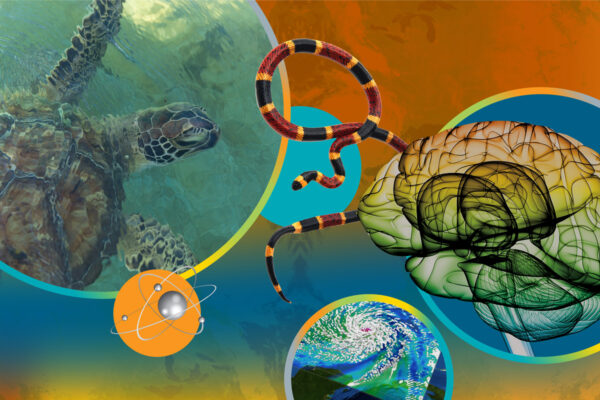Expanding digital access to the campus has always been a goal of The University of Texas at Austin, and given current circumstances, it is now more crucial than ever to engage the curious public and to connect communities.
UT Austin is proud to announce the new Texas Science Festival. From Feb. 16 to March 26, this online festival will feature a series of events designed to open your mind and expand perspectives about how science is working to change the world.
“Those of us who have the good fortune of teaching and exploring ideas of great beauty and impact have a brand new opportunity this year,” said Paul Goldbart, dean of the College of Natural Sciences. “We have the chance to connect what we do — our exciting science, mathematics and computing — to the lives and imaginations of the people ultimately served by the university’s innovations and discoveries.”
From science enthusiasts to people who know nothing about science but are eager to learn more, one and all are invited. Attendees get to log in to phenomenal talks from top Texas researchers and students and to participate in interactive science demos and events. The six-week series also overlaps with and works to amplify STEM engagement experiences for schoolchildren and their families, which are happening in February and March in conjunction with Girl Day at UT Austin and Explore UT.
In the Science Sparks series, featuring “big ideas for busy people,” two scientists each have 10 minutes to explain their research and answer questions over lunch or just before the dinner hour. The lineup covers topics from the mysteries of dark matter to the effects of climate change on life in marine ecosystems. At the kick-off event Tuesday (now rescheduled for Feb. 23 due to inclement weather campus closure), Goldbart will moderate a session with two scientists who have done leading work on COVID-19 vaccines and modeling, molecular bioscientist Jason McLellan and epidemiologist Lauren Ancel Meyers. Here are just a few of the many diverse science topics and their distinguished presenters:
- Cosmic Beginnings: Texas astronomers Steven Finkelstein and Caroline Morley, who are studying the early universe and exploring planets outside our solar system, will offer a peek into what they expect to see as humanity arrives, finally, at the cusp of revealing the nature of our cosmic beginnings and detecting traces of life beyond Earth.
- Big Strides in Fighting Cancer: Hear from two amazing scientists whose work, funded in part by the Cancer Prevention and Research Institute of Texas, will save countless lives in the fight against cancer. Nobel laureate and UT alum Jim Allison led the immunotherapy revolution, and MacArthur fellow and faculty member Livia Eberlin invented the MasSpec Pen, a game-changer for the detection and removal of cancer during surgery.
- Saving the Bees: Learn how science is finding new clues about how to address colony collapse and other contributors to the decline of bees in two little-explored places: the guts and brains of the bees themselves. Two Texas biologists, Nancy Moran and Felicity Muth, weigh in on promising new discoveries that may be the key to ensuring the survival of these incredible species that we all depend on.
- Machine Perception and Intelligent Robots: Understanding the nature of intelligence is one of the greatest scientific challenges of our time. The field of artificial intelligence is meeting this challenge by developing algorithms for creating robust robots that can coexist with us in the real world. Hear from leading experts in machine learning and robotics Kristen Grauman and Peter Stone about how intelligent, fully autonomous robots will shape the future.
For further topics of interest, check out the full schedule here.
The festival also features Deep Dives, in which you spend an afternoon or evening with scientists or teams delving into research of special interest; Hands-On Science, which involves interactive shows and activities for the whole family (including virtual tours of the Hobby-Eberly Telescope, McDonald Observatory sun and moon viewing, and more); and finally, the Outer Limits, for further science learning and interest discovery.
The Texas Science Festival is completely free and open to the public. Alumni, current and prospective students, and members of the science-interested public are invited to actively participate, share curiosities and connect with others.
Learn more about the Texas Science Festival, presenters and speakers, and registration information at sciencefest.utexas.edu.




